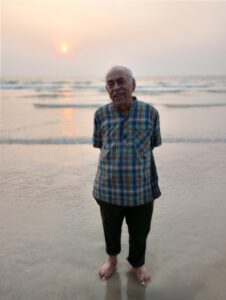A Mini World in Goa
TRANSCEND MEMBERS, 15 May 2023
Dr. Ravi P. Bhatia – TRANSCEND Media Service
Goa is a small state on the west coast of India not very far from the well known city of Bombay. It has been ruled by various dynasties alternatively Hindu, Muslim, Hindu again. It was annexed by Portugal in 1510 by the initiative of Albuquerque who did not disturb the culture and customs of the local people. Two towns Daman and Diu were also annexed and became part of the Portuguese empire. Gradually, Portugal built some churches and other buildings in their own style and for their use in these territories.
The local language — Konkani continued to be spoken by local people although the Portuguese language also was introduced and some people also started learning and using it. These were functionaries of the Portuguese administration and this resulted in the language spreading a bit.
India had been colonised by England for about 200 years. They first entered the country for trade purposes as East India Company. France also was successful in capturing and colonising some Indian regions — mainly Pondicherry. When India became free of the British yoke in 1947, there was pressure on the French and the Portuguese to leave the country. France was the first to leave its colonial territories but Portugal continued to rule over Goa, Daman and Diu. Only when the Indian government decided to use military force to oust Portugal, did they leave the country by sea in December 1961. The freed territories were amalgamated with India.
Today, Goa has become a tourist attraction especially in winters. Its temperature is warm and comfortable. Its beautiful beaches also add to the attraction of not only some Indian tourists but also foreigners from various countries — Russia, Germany, England and some other countries such as France, Japan etc. In fact, earlier many public boards giving relevant information to tourists, were written in the Russian language. There are fewer tourists from USA or Canada perhaps because they have their beaches they could go to, in winters.
As a result of these foreigners and the restaurants as well their shopping of essential items, the values of properties near the beaches have substantially shot up. Indian tourists rent rooms which are cheaper at some distances away.
Some non-Goanese Indians have permanently moved to Goa and rent rooms in their homes. Some have opened small shops offering various items of everyday use — food, clothing, footwear etc. One can see their pleasure on their faces by talking to them and sharing their experiences. Two or three entrepreneurs have started medical facilities in traditional medicines — Ayurveda, Homeopathy. There is no prohibition — one can drink beer or whiskey at the beach restaurants.
As indicated above we see a large number of foreign as well as Indian tourists resulting in a huge transformation of local culture and language. There does not seem to be any major conflict in the people, and they appear happy and satisfied.
One wishes that the rest of India be able to cultivate a common culture and attitude of goodwill and happiness.
______________________________________________
 Dr Ravi P Bhatia is a member of the TRANSCEND Network for Peace Development Environment, an educationist, Gandhian scholar and peace researcher. Retired professor, Delhi University. His new book, A Garland of Ideas—Gandhian, Religious, Educational, Environmental was published recently in Delhi. ravipbhatia@gmail.com
Dr Ravi P Bhatia is a member of the TRANSCEND Network for Peace Development Environment, an educationist, Gandhian scholar and peace researcher. Retired professor, Delhi University. His new book, A Garland of Ideas—Gandhian, Religious, Educational, Environmental was published recently in Delhi. ravipbhatia@gmail.com
Tags: Culture, Goa, History, India, Portugal, Portuguese empire
This article originally appeared on Transcend Media Service (TMS) on 15 May 2023.
Anticopyright: Editorials and articles originated on TMS may be freely reprinted, disseminated, translated and used as background material, provided an acknowledgement and link to the source, TMS: A Mini World in Goa, is included. Thank you.
If you enjoyed this article, please donate to TMS to join the growing list of TMS Supporters.

This work is licensed under a CC BY-NC 4.0 License.

Dear Dr Ravi P. Bhatia, Namsste and greetings from South Africa.
I have read your paper on “A Mini World in Goa” with a great deal of interest, since I have visited India and Goa was classified as the Hippie and Drug Capital, previously, frequented by newly married couples on honeymoon, married “gentlemen” taking their mistresses and “spouse upgrades” from Bombay, as it was called in the old days, to Goa for a weekend of fun and frolic.
While your paper illustrates Goa with great praise of Albuquerque, stating that “It was annexed by Portugal in 1510 by the initiative of Albuquerque who did not disturb the culture and customs of the local people.” However, may I respectfully, point out that Dr Bhatia has missed two important aspects of the occupation of Goa in the presentation:-
1. The conspicuous absence of the mention of “The Portuguese Inquisition” in Goa, which lasted from 1560 to 1812. During this time, the Inquisition operated as a branch of the Portuguese Inquisition and was responsible for investigating and punishing thousands of local Goans, suspected of heresy or practicing religions other than Catholicism. Dreadful atrocities were committed
2. The Konkani language, was literally annihilated by the imperial invaders and was virtually forbidden to speak the language
Afonso de Albuquerque was a Portuguese general who conquered Goa in 1510 and established Portuguese rule in India. Although he did not directly have a role in the establishment of the Inquisition in Goa, his actions set the stage for its eventual creation. Albuquerque was a devout Catholic and was known for his zealous promotion of the faith. His conquest of Goa marked the beginning of Portuguese missionary activities in India, and his efforts to convert the local population to Catholicism set the tone for the religious policies of the Portuguese colonial administration.
Over time, the Portuguese colonial authorities became increasingly concerned about the influence of other religions, particularly Hinduism and Islam, on the Catholic population of Goa. In response to these concerns, the Inquisition was established in Goa in 1560. While the Inquisition initially focused on the Catholic population, it later expanded its scope to include non-Catholics as well.
The reality is that while Afonso de Albuquerque did not directly establish the Inquisition in Goa, but his actions as a Portuguese general played a significant role in the establishment of Portuguese rule in India and the promotion of Catholicism in the region, which ultimately led to the creation of the Inquisition in Goa, with maiming, death and genocide of thousands of Goans. In fact, if a “Tulsi’ plant (Holy Basil) was found growing in your garden, you were arrested, tortured, maimed or even disappeared in the ultimate aim of unearthing the “crypto-Hindus” and converting the pagans into Christianity.
Hence the Portuguese invasion and occupation of Goa has left an inedible dark scar on the city, with eradication of thousands of years of Hinduism and Sanskrit, as well as a cultural genocide and eradication of a unique indigenous language by these Imperial colonisers. The result of these forced conversions, in most cases, during the occupation, has led to the development of churches and cathedrals, as a legacy of the greatest “Genocidal Peace Disruption” of that era.
I will be most grateful if you could kindly refer to my paper on further information, as a sordid chapter of the Goan history in the 16th century. The link is : https://www.transcend.org/tms/2022/05/peace-are-religions-the-cause-of-peace-disruption-in-humanoids-part-3/
Thank you, once again. Keep up the excellent work
Wish you all the best
Kind regards
Hoosen Vawda
e-mail: vawda@ukzn.ac.za
Mobile: 24/7 +27 82 291 4546
Dated: Monday, 15th May 2023 SAST 2050 hours
1 https://en.wikipedia.org/wiki/Konkani_language
2 https://www.bing.com/search?pglt=41&q=tulsi+plant+benefits&cvid=234d0a146c8a4e0b87207873d0025796&aqs=edge.1.0l9j69i11004.11445j0j1&FORM=ANNAB1&PC=U531
2 https://www.banyanbotanicals.com/info/plants/ayurvedic-herbs/tulsi-holy-basil-benefits/#:~:text=Some%20of%20the%20benefits%20of%20tulsi%20include%3A%20Offering,removing%20kapha%20buildup%2C%20and%20promoting%20healthy%2C%20uncongested%20breathing.
3 https://www.britannica.com/place/Goa/History